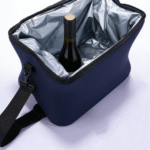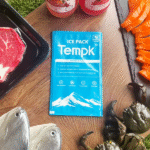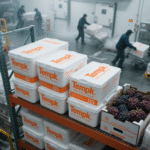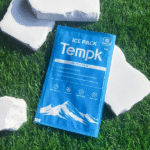Imagine um mundo onde as vacinas perdem potência antes de chegar a clínicas remotas, onde frutas frescas da fazenda estragam no caminho para os supermercados, ou onde os kits de refeição chegam mornos aos clientes desapontados. Estes cenários sublinham o papel silencioso, mas vital, da fabricantes de sacolas de entrega na salvaguarda das cadeias de abastecimento globais. À medida que a demanda por entregas sensíveis à temperatura dispara, fabricantes como a Tempk não estão apenas produzindo contêineres – eles são engenheiros de confiança, sustentabilidade, e inovação em cada ponto.
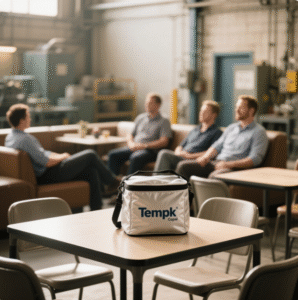
O desafio da fabricação: Além do isolamento
A produção de bolsas térmicas de alto desempenho exige o equilíbrio de prioridades concorrentes:
-
Precisão: Manter faixas rigorosas de temperatura (por exemplo, 2°C–8°C para vacinas) em diversos climas.
-
Durabilidade: Resistir aos perigos das entregas urbanas, como vibração, chuva, and UV exposure.
-
Sustentabilidade: Reduzir a dependência de plásticos e combustíveis fósseis sem comprometer a funcionalidade.
Estudos revelam que 30% das falhas na cadeia de frio decorrem de embalagens mal projetadas, indústrias de custos $35 bilhão anualmente. A Tempk aborda essas lacunas reimaginando os processos de fabricação, desde as matérias-primas até a integração de tecnologia inteligente.
Domínio de fabricação de Tempk: Onde a ciência encontra o artesanato
Como pioneiro em soluções térmicas, Tempk combina R de última geração&D com produção ecologicamente consciente para entregar sacolas que redefinem os padrões da indústria:
1. Inovação Avançada em Materiais
-
Tecidos Híbridos de Aerogel: Desenvolvido internamente, essas camadas ultrafinas reduzem a transferência de calor 55% em comparação com a espuma tradicional, permitindo designs leves, porém robustos.
-
Materiais de mudança de fase de base biológica (PCMs): Derivado de óleos vegetais, esses géis não tóxicos mantêm temperaturas precisas por 24 a 72 horas, adaptável a produtos farmacêuticos ou perecíveis.
2. Processos de Fabricação Inteligentes
-
Controle de qualidade baseado em IA: Câmeras e sensores inspecionam cada costura e vedação, alcançar um 99.9% taxa sem defeito.
-
Linhas de produção modulares: Alterne rapidamente entre bolsas de uso médico e sacolas de compras a granel, reduzindo os prazos de entrega 50%.
3. Sustentabilidade incorporada no DNA
-
Fornecimento de materiais circulares: 80% dos plásticos são reciclados de resíduos oceânicos, enquanto os forros usam revestimentos de amido de milho biodegradáveis.
-
Fábricas com desperdício zero: Instalações movidas a energia solar reciclam 95% de água e materiais de sucata, ganhando ISO 14001 certificação.
4. Personalização em escala
-
Marca sob demanda: A tecnologia de impressão digital aplica logotipos, Códigos QR, ou instruções de segurança em 24 horas.
-
Compartimentos Personalizados: Divisórias cortadas a laser atendem a necessidades exclusivas, como zonas separadas para itens quentes/frios ou amostras de laboratório sensíveis a choques.
A diferença temporária: Além da bolsa
A Tempk faz parceria com clientes para preparar suas cadeias de frio para o futuro:
-
Integração da IoT: Incorpore sensores durante a fabricação para rastreamento em tempo real, reduzindo a deterioração por 30%.
-
Serviços de ciclo de vida: Reparar, reciclar, ou atualize as malas através da rede global da Tempk, estendendo os ciclos de vida dos produtos.
-
Domínio Regulatório: Sacolas pré-certificadas atendem à FDA, UE, e padrões da OMS, acelerando a entrada no mercado.
O futuro: Fabricação como solução climática
Com o mercado global de embalagens térmicas prestes a atingir $23 bilhão por 2028, Tempk é pioneira:
-
Produção neutra em carbono: Cada saco compensa 20 kg de CO2 através de energias renováveis e parcerias de reflorestamento.
-
Transparência Blockchain: Digitalize uma sacola para rastrear seus materiais, pegada de carbono, e registros de segurança - um recurso exigido por 65% de compradores B2B.
Conclusão
Numa era em que cada entrega acarreta consequências climáticas e comerciais, escolher o fabricante certo é fundamental. Tempk se destaca por mesclar artesanato artesanal com brilho tecnológico, provando que as bolsas térmicas podem ser guardiãs planetárias e geradoras de lucro. Para empresas que buscam prosperar na nova fronteira da cadeia de frio, A Tempk não é apenas um fornecedor – é um aliado estratégico na entrega de excelência.


















